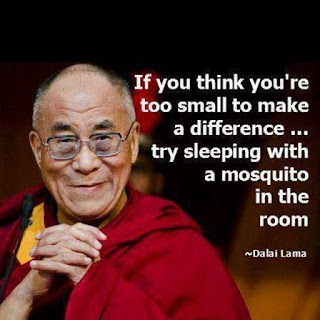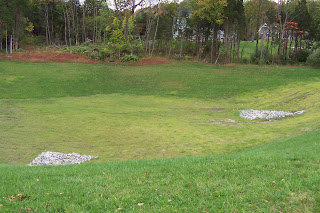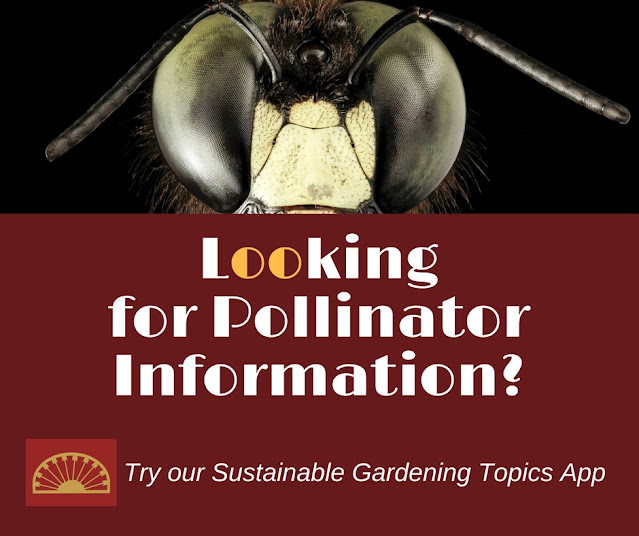Be The Mosquito
One of my favorite quotes is the Dalai Lama’s, “If you think you are too small to make a difference, try sleeping with a mosquito.” I don’t think the Dalai Lama meant that we have to be annoying. After all, the mosquito is just going about its normal everyday activities. But whether or not the mosquito is in the room makes all the difference to us.
Similarly, what each of us does on our little patch of the Earth, collectively makes all the difference to our planet’s health. We don’t necessarily need to make sudden wholesale changes in our lifestyles, be less comfortable in our own castles, or add more work to our already-busy schedules.
Facing complex choices
This came home to me recently at the supermarket. The market chain had recently introduced an organic house brand. I was eager to try it out and I needed six cans of beans. The organic house brand cost 30% more than the regular house brand. I briefly wondered why the organic lemons could sell for the same price as regular lemons, but the beans couldn’t – and then walked on with my six cans of regular beans thinking, “We can’t afford a 30% increase in our food bill!” But I didn’t feel good about it.
In fact, I felt downright unhappy about it. Farmers have to make significant sacrifices to become certified organic. The switch from traditional farming methods requires a three-year process, written plan, regular inspections, increased labor, and may result in decreased crop yields.
Farmers are finally doing what we asked them to do – grow nutritious, wholesome, pesticide-free, non-genetically engineered food. The supermarket chain is doing what we’ve asked them to do – provide a distribution network so that organic farmers can get their products to consumers. And people like me, who really care and want to support organic options, are not buying.
The solution – easing into change
This continued to nag at me until I realized the solution had been staring me in the face all along. I didn’t have to make an all-or-nothing choice. I can afford to invest 30 cents in organic farming. I could have purchased five cans of regular beans and one can of organic beans. And next time I’m at the store, I will do just that. My little contribution might not seem like much on the surface of things, but if everyone who shopped in that supermarket – and every other supermarket in the U.S. -- bought one organic item each week….well, you get the picture.
Be the mosquito in the room.
Like The Sustainable Gardening Library’s Page on Facebook
Follow The Sustainable Gardening Library on Twitter
Similarly, what each of us does on our little patch of the Earth, collectively makes all the difference to our planet’s health. We don’t necessarily need to make sudden wholesale changes in our lifestyles, be less comfortable in our own castles, or add more work to our already-busy schedules.
Facing complex choices
This came home to me recently at the supermarket. The market chain had recently introduced an organic house brand. I was eager to try it out and I needed six cans of beans. The organic house brand cost 30% more than the regular house brand. I briefly wondered why the organic lemons could sell for the same price as regular lemons, but the beans couldn’t – and then walked on with my six cans of regular beans thinking, “We can’t afford a 30% increase in our food bill!” But I didn’t feel good about it.
In fact, I felt downright unhappy about it. Farmers have to make significant sacrifices to become certified organic. The switch from traditional farming methods requires a three-year process, written plan, regular inspections, increased labor, and may result in decreased crop yields.
Farmers are finally doing what we asked them to do – grow nutritious, wholesome, pesticide-free, non-genetically engineered food. The supermarket chain is doing what we’ve asked them to do – provide a distribution network so that organic farmers can get their products to consumers. And people like me, who really care and want to support organic options, are not buying.
The solution – easing into change
This continued to nag at me until I realized the solution had been staring me in the face all along. I didn’t have to make an all-or-nothing choice. I can afford to invest 30 cents in organic farming. I could have purchased five cans of regular beans and one can of organic beans. And next time I’m at the store, I will do just that. My little contribution might not seem like much on the surface of things, but if everyone who shopped in that supermarket – and every other supermarket in the U.S. -- bought one organic item each week….well, you get the picture.
Be the mosquito in the room.
 |
| Discover The Sustainable Gardening Library |
Like The Sustainable Gardening Library’s Page on Facebook
Follow The Sustainable Gardening Library on Twitter


